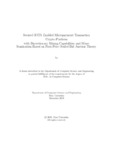Secured iota enabled micropayment transaction crypto-platform with discretionary mining capabilities and miner nomination based on first-price sealed bid auction theory
Abstract
The commercial utilization of cryptocurrency as a digital asset in being more and more sought-after on each successive year. Most of the well renowned cryptoplatforms now-a-days are devised based on the premise of the concept of blockchain. These cryptocurrencies work as an alternative medium of exchange using cryptography to secure the transactions on a distributed ledger. For validating a rationally substantial transaction, all of the blockchain-based cryptocurrencies requires a miner who will execute the proof-of-work to secure network consensus even in the presence of malicious nodes. After solving the cryptographic hash puzzles, the mining nodes are then compensated with a block reward and a mining/transaction fee for their services. When using regular blockchain-based digital cryptocurrency such as bitcoin, ripple, etherium etc. most of the time the respected crypto-platforms discourages low valued transactions from being executed. Because often, the transaction fee may exceed the value of the product or service that are being purchased. As a result, for this particular reason, micropayment systems using digital crypto-platforms remains largely under developed. To solve this complication our thesis model was emanated from the notion of IOTA, which is considered as a minerless cypto-platform where the requisition of miners are disregarded thus enabling users to relish the advantages of microtransactions, however with the inclusion of “Discretionary mining”. “Discretionary Mining” refers to the hypothesis of availability of mining capabilities at the discretion of the users. While using IOTA, the efficiency of the Tangle network largely depends on the computational power of nodes. Moreover, unconfirmed transaction node also known as “Tips” with low computational capability may not be able to validate it’s previous two transactions in time which will result in the degradation of the entire Tangle. Hence, our research of Discretionary Mining was derived from the postulation of distributive computing where a low powered smart device can outsource complex computations while validating transactions such as solving cryptographic puzzle (Hashcash) which they cannot execute on their own. Thus enabling users to reap the benefits of microtransactions without the network being completely minerless.

